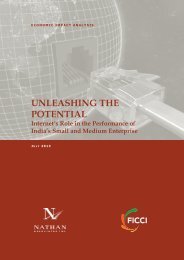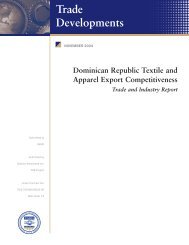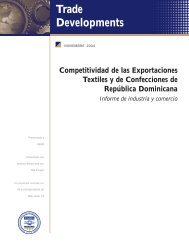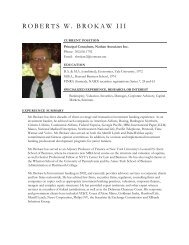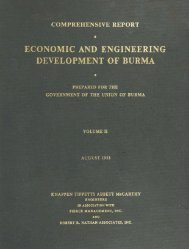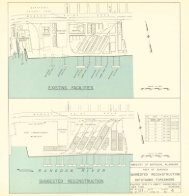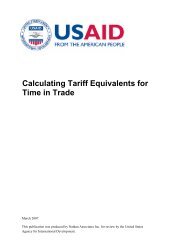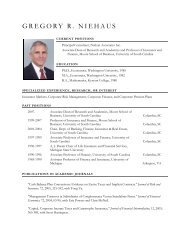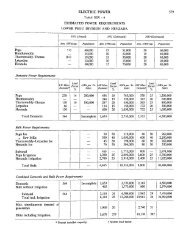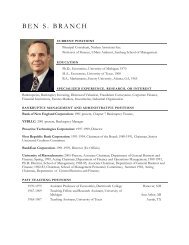Putting it to Work in Developing Countries - Nathan Associates
Putting it to Work in Developing Countries - Nathan Associates
Putting it to Work in Developing Countries - Nathan Associates
Create successful ePaper yourself
Turn your PDF publications into a flip-book with our unique Google optimized e-Paper software.
But, <strong>in</strong> add<strong>it</strong>ion <strong>to</strong> these commercial-economic<br />
fac<strong>to</strong>rs, mult<strong>in</strong>ationals pay close attention <strong>to</strong><br />
pol<strong>it</strong>ical, <strong>in</strong>st<strong>it</strong>utional, and regula<strong>to</strong>ry characteristics<br />
that <strong>to</strong>gether def<strong>in</strong>e a host country’s<br />
“<strong>in</strong>vestment climate.”<br />
BACK TO BASICS—THE<br />
RIGHT INVESTMENT<br />
CLIMATE<br />
A country’s <strong>in</strong>vestment climate is the sum of <strong>it</strong>s<br />
public policy and <strong>in</strong>st<strong>it</strong>utional characteristics<br />
and cond<strong>it</strong>ions that affect the attractiveness and<br />
prof<strong>it</strong>abil<strong>it</strong>y of establish<strong>in</strong>g and operat<strong>in</strong>g a bus<strong>in</strong>ess.<br />
As the World Bank has said, “Governments<br />
<strong>in</strong>fluence the <strong>in</strong>vestment climate through the<br />
impact of their policies and behaviors on the<br />
costs, risks, and barriers <strong>to</strong> compet<strong>it</strong>ion fac<strong>in</strong>g<br />
firms.” 3 A healthy economy requires gett<strong>in</strong>g the<br />
<strong>in</strong>vestment climate right. Do<strong>in</strong>g so benef<strong>it</strong>s all<br />
<strong>in</strong>ves<strong>to</strong>rs—foreign and domestic alike. A sound<br />
<strong>in</strong>vestment climate attracts not only foreign<br />
direct <strong>in</strong>vestment, but also figures heavily <strong>in</strong><br />
domestic <strong>in</strong>ves<strong>to</strong>rs’ decisions <strong>to</strong> establish or<br />
expand their bus<strong>in</strong>esses. 4 Moreover, there is<br />
ample empirical evidence that differences <strong>in</strong> productiv<strong>it</strong>y<br />
<strong>in</strong> both FDI and domestic <strong>in</strong>vestment<br />
can be expla<strong>in</strong>ed by differences <strong>in</strong> <strong>in</strong>vestment<br />
climate, <strong>in</strong>clud<strong>in</strong>g good governance, <strong>in</strong>st<strong>it</strong>utions,<br />
and government policies. 5 W<strong>it</strong>h dis<strong>to</strong>rtions and<br />
<strong>in</strong>efficiencies that erode productiv<strong>it</strong>y removed, a<br />
sound climate boosts the qual<strong>it</strong>y of all <strong>in</strong>vestment<br />
<strong>in</strong> add<strong>it</strong>ion <strong>to</strong> encourag<strong>in</strong>g cap<strong>it</strong>al accumulation.<br />
This is especially valuable <strong>in</strong> mak<strong>in</strong>g<br />
the most of FDI.<br />
WHAT IS “RIGHT”<br />
An <strong>in</strong>vestment climate has three elements: cond<strong>it</strong>ions<br />
of macroeconomic stabil<strong>it</strong>y, <strong>in</strong>clud<strong>in</strong>g<br />
<strong>in</strong>st<strong>it</strong>utional and policy predictabil<strong>it</strong>y; the<br />
microeconomic enabl<strong>in</strong>g environment; and the<br />
<strong>in</strong>frastructure base. A mult<strong>in</strong>ational takes all<br />
three <strong>in</strong><strong>to</strong> account, although the relative weights<br />
given <strong>to</strong> one element or another <strong>in</strong> FDI decisions<br />
may vary. 6 But because all elements are<br />
important, gett<strong>in</strong>g the <strong>in</strong>vestment climate<br />
“right” means mak<strong>in</strong>g policy and <strong>in</strong>st<strong>it</strong>utional<br />
reforms <strong>in</strong> each area. 7<br />
For example, a sound <strong>in</strong>vestment climate first<br />
requires macroeconomic stabil<strong>it</strong>y and <strong>in</strong>st<strong>it</strong>utional<br />
and policy predictabil<strong>it</strong>y. The famed<br />
“Wash<strong>in</strong>g<strong>to</strong>n Consensus” set forth reform prescriptions<br />
for ensur<strong>in</strong>g this result. Such reforms<br />
establish compet<strong>it</strong>ive exchange rates and marketdeterm<strong>in</strong>ed<br />
<strong>in</strong>terest rates; fiscal discipl<strong>in</strong>e, efficient<br />
tax systems and prudent public expend<strong>it</strong>ure<br />
and debt management; privatization, deregulation,<br />
and general recogn<strong>it</strong>ion of property<br />
rights. Liberalization of trade and FDI policy is<br />
also part of the reform package. 8 But while<br />
macroeconomic stabil<strong>it</strong>y and <strong>in</strong>st<strong>it</strong>utional predictabil<strong>it</strong>y<br />
are necessary <strong>to</strong> attract FDI and are<br />
achievable through such reforms, many experts<br />
now agree that they are not sufficient.<br />
This is why the right <strong>in</strong>vestment climate also<br />
stresses a proper enabl<strong>in</strong>g environment at the<br />
microeconomic level. Microeconomic fac<strong>to</strong>rs<br />
affect the way <strong>in</strong>dividuals or firms operate <strong>in</strong> the<br />
macroeconomic environment. These fac<strong>to</strong>rs are<br />
key <strong>to</strong> project prof<strong>it</strong>abil<strong>it</strong>y and thus <strong>to</strong> attract<strong>in</strong>g<br />
FDI. 9 A pos<strong>it</strong>ive enabl<strong>in</strong>g environment is characterized<br />
by<br />
• Good governance, maximized through transparency<br />
and the rule of law, <strong>in</strong>clud<strong>in</strong>g a range<br />
of specific <strong>in</strong>ves<strong>to</strong>r protections <strong>to</strong> secure and<br />
safeguard private property and preserve the<br />
sanct<strong>it</strong>y of contracts, as well as measures <strong>to</strong><br />
m<strong>in</strong>imize crime;<br />
• Openness <strong>to</strong> trade, achieved by liberaliz<strong>in</strong>g<br />
foreign trade policy, but also by remov<strong>in</strong>g<br />
adm<strong>in</strong>istrative barriers <strong>to</strong> entry and ex<strong>it</strong> <strong>in</strong><br />
domestic markets, end<strong>in</strong>g state monopolies,<br />
and generally promot<strong>in</strong>g compet<strong>it</strong>ive<br />
cond<strong>it</strong>ions;<br />
• M<strong>in</strong>imal dis<strong>to</strong>rtions, created by lower<strong>in</strong>g tax<br />
rates and elim<strong>in</strong>at<strong>in</strong>g arb<strong>it</strong>rary regulation and<br />
overregulation, and especially by reduc<strong>in</strong>g the<br />
adm<strong>in</strong>istrative “red-tape fac<strong>to</strong>r” <strong>in</strong> do<strong>in</strong>g bus<strong>in</strong>ess.<br />
This allows and encourages <strong>in</strong>dividuals<br />
such as upstream suppliers for foreign affiliates<br />
<strong>to</strong> start their own bus<strong>in</strong>esses, and <strong>to</strong> use their<br />
land and property as collateral <strong>to</strong> raise cash<br />
and obta<strong>in</strong> cred<strong>it</strong>. Embrac<strong>in</strong>g the pr<strong>in</strong>ciple of<br />
nondiscrim<strong>in</strong>ation between foreign <strong>in</strong>ves<strong>to</strong>rs<br />
56



